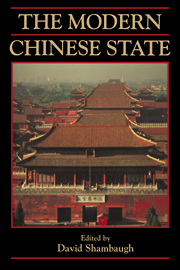Book contents
- Frontmatter
- Contents
- List of Contributors
- List of Illustrations
- List of Abbreviations
- Preface
- Introduction: The Evolving and Eclectic Modern Chinese State
- 1 The Late Imperial Chinese State
- 2 The Chinese State during the Republican Era
- 3 The Evolution of the State in the Republic of China on Taiwan
- 4 The Chinese State during the Maoist Era
- 5 The Chinese State in the Post-Mao Era
- 6 The Chinese Communist Economic State in Comparative Perspective
- 7 The Future of the Chinese State
- Index
2 - The Chinese State during the Republican Era
Published online by Cambridge University Press: 15 October 2009
- Frontmatter
- Contents
- List of Contributors
- List of Illustrations
- List of Abbreviations
- Preface
- Introduction: The Evolving and Eclectic Modern Chinese State
- 1 The Late Imperial Chinese State
- 2 The Chinese State during the Republican Era
- 3 The Evolution of the State in the Republic of China on Taiwan
- 4 The Chinese State during the Maoist Era
- 5 The Chinese State in the Post-Mao Era
- 6 The Chinese Communist Economic State in Comparative Perspective
- 7 The Future of the Chinese State
- Index
Summary
After 1900 Qing government leaders launched a series of reforms aimed at strengthening China so that it could contain foreign encroachment and enrich society as well as preserve Manchu monarchical power. Within a decade a new Ministry of Education had begun educational reforms and recruiting talented civil servants for government; a flood of imperial edicts established new ministries of trade, police, foreign affairs, and army; and former offices including the Court of Sacrificial Worship, the Banqueting Court, and the Court of State Ceremonial were annexed to the Ministry of Rites. As new central administrative organs such as the Ministry of Posts and Communications and the Ministry of Justice were set up, they each had only one head instead of one Manchu and one Chinese as in the past. Various committees drafted a constitution and rules for electing provincial, national, and local self-governing assemblies, and another compiled a new criminal code, along with commercial and civil codes. These reforms – designed to save the Qing dynasty and protect the powers of provincial governors and gentry elites – restructured the state and delegated more power to the provinces and the people.
The Qing rulers and their supporters continually had to confront the problem – I will call it the Machiavelli problem – of persuading those who benefited from the old order not to oppose their innovations and convincing those who might benefit but were too timid to support reform to do so. On the one hand, former Manchu officials and displaced central bureaucrats, military officers, and conservative gentry did not welcome these political reforms and feared their loss of power and privilege.
- Type
- Chapter
- Information
- The Modern Chinese State , pp. 42 - 72Publisher: Cambridge University PressPrint publication year: 2000
- 2
- Cited by



